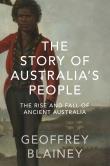 4043382453692257208.jpg
4043382453692257208.jpg
 The Story of Australia's People Volume 1: The Rise and Fall of Ancient Australia
single work
single work
The Story of Australia's People Volume 1: The Rise and Fall of Ancient Australia
single work
single work
 4043382453692257208.jpg
4043382453692257208.jpg
 The Story of Australia's People Volume 1: The Rise and Fall of Ancient Australia
single work
single work
The Story of Australia's People Volume 1: The Rise and Fall of Ancient Australia
single work
single work
The vast continent of Australia was settled in two main streams, far apart in time and origin.
'The first came ashore some 50,000 years ago when the islands of Australia, Tasmania and New Guinea were one. The second began to arrive from Europe at the end of the eighteenth century. Each had to come to terms with the land they found, and each had to make sense of the other. '
'The long Aboriginal occupation of Australia witnessed spectacular changes. The rising of the seas isolated the continent and preserved a nomadic way of life, while agriculture was revolutionising other parts of the world. Over millennia, the Aboriginal people mastered the land's climates, seasons and resources.'
'Traditional Aboriginal life came under threat the moment Europeans crossed the world to plant a new society in an unknown land. That land in turn rewarded, tricked, tantalised and often defeated the new arrivals. The meeting of the two cultures is one of the most difficult and complex meetings in recorded history. '
'In this book Professor Geoffrey Blainey returns first to the subject of his celebrated works on Australian history, Triumph of the Nomads (1975) and A Land Half Won (1980), retelling the story of our history up until 1850 in light of the latest research. He has changed his view about vital aspects of the Indigenous and early British history of this land, and looked at other aspects for the first time.' (Source: Publisher's website)
'Geoffrey Blainey is Australia’s happy historian. ‘Blame’ is not in his vocabulary and his hindsight points no fingers at the past. Thus our nation’s story is told congenially, in large typeface, without footnotes to trouble the ‘general reader’ to whom it is directed – the author’s trademark generalisations come with the authority of his age and his achievements. They are nicely, sometimes lyrically, expressed, as he tells two stories – triumphal (how the progeny of British convicts built a prosperous nation) and tragic (the despoliation and degradation of our indigenous people) without bothering too much about how they may have been causally related.' (Introduction)
'Geoffrey Blainey is Australia’s happy historian. ‘Blame’ is not in his vocabulary and his hindsight points no fingers at the past. Thus our nation’s story is told congenially, in large typeface, without footnotes to trouble the ‘general reader’ to whom it is directed – the author’s trademark generalisations come with the authority of his age and his achievements. They are nicely, sometimes lyrically, expressed, as he tells two stories – triumphal (how the progeny of British convicts built a prosperous nation) and tragic (the despoliation and degradation of our indigenous people) without bothering too much about how they may have been causally related.' (Introduction)